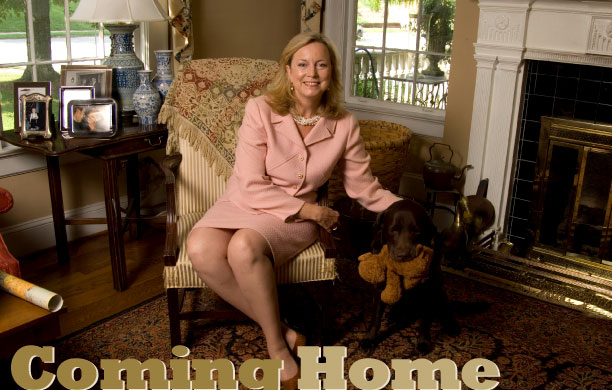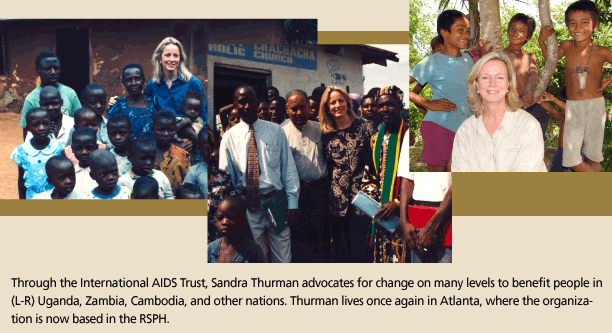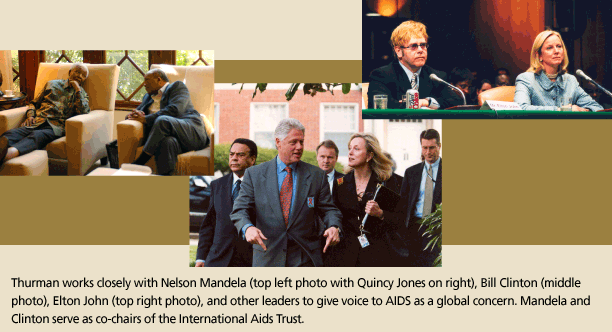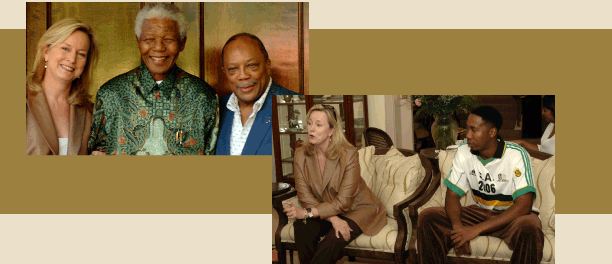














|

 |
| |
|
|
| |
When
the International AIDS Trust (IAT) moved to the Rollins School of
Public Health (RSPH) this past summer, IAT President SandraThurman
found herself back home. An Atlanta native, she's living once
more in the Morningside house she kept all the years she was based
in Washington, D.C., serving as AIDS czar under President Clinton
and then as head of IAT, a not-for-profit organization that helps
galvanize leadership, mobilize resources, and promote effective
interventions in the global battle against AIDS. |
|
| |
|
|
| |
 E-mail
to a Friend
E-mail
to a Friend  Printer
Friendly Printer
Friendly |
|
| |
|
|
| |
In
some ways, Thurman says, it feels as if the International AIDS Trust
has come home too.
Although IAT was never officially
connected to the RSPH before, Thurman has worked on the front lines
of the AIDS battle from the earliest days of the epidemic with many
researchers and physicians now associated with the RSPH and Emory.
"I've felt close to Rollins
for a long time. I've known Jim Curran from the early days
of the epidemic, when he was head of the CDC's AIDS program.
There's not another dean of a major U.S. school of public
health with his expertise in HIV and AIDS. AIDS is extremely complex
because of all the underlying co-factors that exacerbate this disease.
And Jim ‘got it' way before anyone else seemed to,"
she says. "In fact, we have many people here at Rollins who
were part of the history of learning to deal with AIDS and have
so much to share with people around the world. I see the International
AIDS Trust and Rollins as a great match." |
|
| |
|
|
| |
Ties
to AID Atlanta |
|
| |
How
did this Mercer University graduate who, in her words, once assumed
she'd do some social work, get married, and have kids, wind
up in mid-life as one of the world's leading experts on AIDS
issues, traveling around the world working with leaders like Clinton,
British Prime Minister Tony Blair, President Yoweri Museveni of
Uganda, and former President Nelson Mandela of South Africa? And
how did she gain the expertise, knowledge, and passion to help change
U.S. policy to encompass HIV as a global problem?
Thurman's involvement with AIDS
evolved from events she confronted in her personal life. Her father
was diagnosed with cancer in the early l980s. "I became involved
with hospice when we learned his illness was terminal, and we made
the decision to keep him at home, where he died in l981,"
she recalls.
Her dad had worked in the garment
industry, and her mother, a lawyer, was active in the arts. So Thurman
grew up knowing people who worked in fashion, theater, and the arts,
many of whom were gay. About the same time her father died of cancer,
several of her gay friends were stricken with a mysterious illness
associated with swollen lymph glands, Kaposi's sarcoma, and
a rare lung infection diagnosed as Pneumocystis carinii
pneumonia. They were some of the first people in Atlanta with the
disease that would eventually be called AIDS.
"Both the fashion and art communities
were hit very hard early on," says Thurman. It was a time
when victims were too often ignored, shunned, and even abandoned.
Thurman volunteered to do respite care and, using the skills she'd
acquired during her father's illness, taught people how to
tend the sick and homebound.
In the mid-l980s, Thurman became a
volunteer at AID Atlanta, a community-based nonprofit organization
providing health and support services to people living with HIV/AIDS.
By l988, her drive and commitment had landed her a full-time position
there as director of policy and development; less than a year later
she was named executive director. Long involved with fund raising
for other nonprofit health organizations, her fund-raising and management
savvy soon turned then-faltering AID Atlanta into a viable organization.
In fact, under her leadership, AID Atlanta tripled in size, becoming
a multimillion dollar, direct-service agency with 90 staff members
and more than 1,000 volunteers.
Did Thurman know at that point AIDS
would become her life's work? "Absolutely not,"
she answers. "I really thought, as most of us did, that the
epidemic would be over in a few years, that science would find an
answer. I never dreamed I would still be doing this work 20 years
later." |
|
| |
|
|
 |
| |
|
|
| |
The
AIDS czar |
|
| |
At
the height of the epidemic, Thurman noted that many AID Atlanta
social workers were suffering from burnout. "I would pull
them off the front lines for a while to give them a little rest.
Then I realized I was beginning to experience some of the same symptoms,
so I knew I needed a break," she says.
She discussed her concerns with the
chairman of AID Atlanta's board, William Foege, co-founder
and executive director of the Task Force for Child Survival and
Development. Foege, now Emeritus Presidential Distinguished Professor
of International Health at the RSPH, suggested a change. Thurman
could work with him as Task Force director of advocacy programs.
Although she continued to serve on the AID Atlanta board, she accepted
the new position and, from l993 to l996, focused on health problems
of children internationally, including immunization and the eradication
of polio. "This was my first work in the global arena, and
I couldn't have had a better mentor than Bill Foege,"
Thurman says.
Her career would go down another serendipitous
fork in the road when close friend and Democratic Party strategist
James Carville asked her to serve as political director for Bill
Clinton during the Georgia primary campaign. She accepted and wrote
some of Clinton's first briefing papers on HIV and AIDS in
l992. President Clinton was impressed and, after his election, Thurman
went to work for him as director of Citizen Exchange Programs in
the U.S. Information Agency. In l997, Clinton asked her to become
director of National AIDS Policy—the country's AIDS
"czar."
"There were only two czars in
the United States at that time, for AIDS and drugs, positions created
to coordinate all the organizations working in a particular arena.
I describe it as sort of like herding cats," she says. "I
took the job with one caveat—we had to include global AIDS
in the portfolio. They agreed, and we moved the Office of National
AIDS Policy out of the Domestic Policy Council and put it under
the President."
Working with myriad government organizations,
including the CDC, NIH, and the State and Justice departments, Thurman
made sure the United States was placing AIDS in an international
context. And she convinced President Clinton that AIDS was fast
becoming a global crisis. The result was that Thurman was responsible
for a change in U.S. policy.
"One of the things I still find
staggering is that before I arrived at the White House, U.S. government
funding for global AIDS programs had been about $125 million a year
under both the former Bush administration and the Clinton administration,"
she says. But once Thurman retooled the office to focus on global
AIDS and got the attention of the President and senior staff, over
a two-year period, funding for global AIDS programs tripled and
the LIFE Initiative, the first global multisector approach to fighting
HIV and AIDS, was created. "Finally, AIDS was becoming recognized
as an economic issue, a justice issue, a gender issue, and a stability
and security issue. And then we went out and got Congress to fund
this new platform," she says.
In l999, at President Clinton's
request, Thurman accompanied a bipartisan group including members
of Congress, their staff, and philanthropists to see firsthand the
impact of AIDS on the African continent. "When we got home,
we sent a report to Congress outlining what we saw, and it was not
very hard at all to get them to go along with our recommendations,"
she comments. |
|
| |
|
|
 |
| |
|
|
| |
IAT
is born |
|
| |
After
Clinton left office, the International AIDS Trust was created to
privatize and continue many of the same programs developed under
that administration's AIDS office. Clinton has remained involved,
co-chairing the IAT board with Mandela. "IAT works with leaders
in government, civil society, and faith-based institutions to develop
innovative and sustainable approaches to dealing with the underlying
co-factors that exacerbate the spread of HIV: poverty, gender inequity,
access to education [particularly for girls], access to economic
opportunity, and human rights," Thurman explains. "We
garner and develop leadership at the very top levels all the way
down to the grass roots. For example, we were funded by the Gates
Foundation to create an organization of African First Ladies Against
AIDS, which is very successful and active all over the continent."
The focus of IAT has changed in the
past couple of years, she adds, particularly in the developing world
where the majority of those infected and affected are women and
a large portion of health care is delivered by faith-based institutions.
IAT is working to mobilize and equip women and religious leaders
to deal with the AIDS epidemic, especially in the poorest parts
of the world where the only infrastructure is often the religious
institution.
Thurman is exploring ways for
the IAT and the RSPH to work together. "At Emory, we have
the folks at Rollins who are highly experienced in working with
AIDS, and we also have the Candler School of Theology and The Carter
Center. Plus CARE and the CDC are located in Atlanta, which is quite
a hub for public health. We are talking about ways to partner and
use resources we have here and some we have overseas to put together
programs that draw on the strengths of the history of IAT and the
history of Rollins," Thurman says.
In the early days of AID Atlanta, 20% of
Thurman's staff was infected with HIV, and most have since
died. Today, thanks to antiretroviral therapies, AIDS is no longer
a near automatic death sentence, at least in the United States.
The epidemic, however, is devastating millions of lives in other
parts of the world. There is urgency in Thurman's voice when
she relates the facts.
"It is a nightmare on the African
continent, with women and children being hit the hardest now. The
second highest rate of infection is in the Caribbean, right at our
own back door. The fastest-rising rates of infection are in the
former Soviet Union and Eastern Europe. We have an epidemic that
has swept the globe in large part while we were sort of twiddling
our thumbs," she says. "And it is true we now have treatment,
but the fact is the places where AIDS hits hardest are where people
are living on a dollar, maybe two, a day. Drugs are still beyond
the reach of the majority of people who need them." |
|
| |
|
|
 |
| |
|
|
| |
|
|
| |
Hope
amid despair |
|
| |
Thurman
will continue to travel in her work, most often to Africa and Asia.
Every six weeks, she travels to Limuru, Kenya, where she's pursuing
a master's degree in theology at Saint Paul's United Theological
College.
"My colleagues at Rollins have
been very supportive of this," she notes. "I'll be working
with women's groups and faith leaders while I'm there, too, to help
them talk openly about AIDS to build an effective response."
With 40 million people infected with
HIV worldwide and 14,000 people becoming infected every day, how
does Thurman keep up her hope and passion for fighting AIDS?
"Whenever I feel down or like
whining, I just think of Bernadette, a 72-year-old grandmother in
Uganda who has lost 11 of her 12 kids to AIDS and is caring for
35 grandchildren, five of whom are infected. She received $50 through
a micro-lending program and with a group of other grandmothers started
a business, growing vegetables and raising chickens. She has her
five infected grandchildren on meds, and most of her grandkids are
in school. And she's not unusual.
"When I go out into the communities
and actually see the extraordinary work being done by ordinary people
on the ground every day, people who have nothing, giving whatever
they can to people who have less, it is so inspiring to me. I see
hope every place I go in the midst of all this despair."
Sherry
Baker is a freelance writer in Atlanta. |
|
| |
|
|
| |
|
|
|
|
|
|



